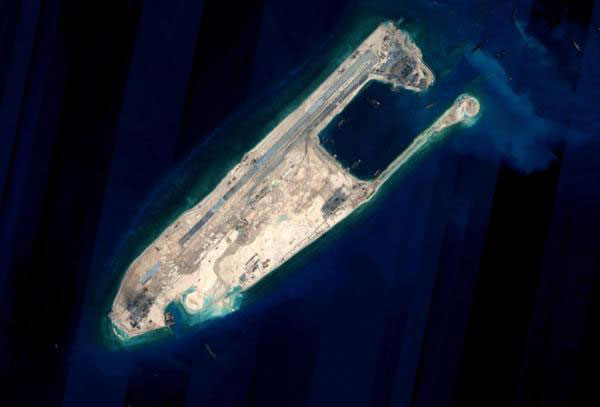
This satellite image shows the Yongshu Jiao of China's Nansha Islands. (Photo/Xinhua)
The United States began flexing its military muscles in the South China Sea last year as part of its political and diplomatic maneuvers in the region. The U.S. knows better than any other country that it cannot directly prevent China's sovereign activities in the South China Sea. So it has attempted to do the next best thing, that is, make it more costly for China to safeguard its sovereignty through military, political, diplomatic and media tools. It is thus clear that the U.S.' aim is to put China in an embarrassing diplomatic position.
Despite the China-U.S. friction in the South China Sea, however, a direct conflict between the two countries is not imminent. The U.S. military's moves in the South China Sea may apparently be aimed at deterring China from expanding its influence, but they are primarily meant to serve as tools for accomplishing Washington's political and diplomatic goals.
On "freedom of navigation operations" in the South China Sea, the U.S. has always said they are no different from such practices in other parts of the world. Some Chinese media outlets and experts seemed to have bought the U.S. argument and said the U.S.' aim is to challenge China's "excessive maritime claims".
But the recent U.S. military operations in the South China Sea have been extraordinary. True, the U.S. conducts dozens of such operations each year across the world, but they are usually carried out in a quiet and low-key manner, and their details are always kept secret. By deploying advanced weaponry, coupled with extensive media coverage, however, the U.S. military seems to prove a Hollywood blockbuster-like point.
The U.S. military's operations have drawn the attention of the public and politicians both in the U.S. and China, especially because they have evolved into a political issue across the Pacific. Besides, the White House has tried to create a crisis atmosphere by trumpeting the "China threat" and portraying the U.S. military as a strong defender of national interests.
As for Beijing, Washington could, by swaying Chinese people's opinion, exert influence on China's domestic political process. Washington intends to involve a growing number of Chinese to debate Beijing's policy on the South China Sea issue, and prevent Chinese elites from reaching a consensus on the issue. The U.S. military's "freedom of navigation operations", viewed by many in China as an insult, were also meant to undermine the authority of the Chinese government and create more difficulties for it.
For the U.S., such operations are useful diplomatic tools, used to kill two birds with one stone. On the one hand, they could exert pressure on China. On the other, they could help appease U.S. allies and partners such as the Philippines and Vietnam in the region.
By politicizing its operations in the South China Sea, the U.S. also intends to test China's policies. Washington often blames Beijing for conducting activities that it claims threaten peace, and for expanding the gray areas between peace and war. But such statements can be used to describe the U.S. military's South China Sea policy. U.S. Navy vessels first entered the waters off China's Nansha Islands and then sailed close to Xisha Islands. After that the U.S. Navy conducted "freedom of navigation operations" in undisputed territorial waters off some islands in the South China Sea.
In carrying out such operations, the U.S. clearly followed a cautious approach of taking one step first to test the response from China before making the next move. In other words, its strategy has been clear: testing China's response and policy bottom line.
In the face of U.S. military operations in the South China Sea, China has no choice but to be prepared militarily. Due to the complexity and politicization of U.S. military operations, China should look beyond the "freedom of navigation operations", and realize the political motives and impact of the U.S. military's operations. More importantly, China should use all options to counter and expose the traps set by the U.S..
The author Hu Bo is a research fellow at the Institute of Ocean Research of Peking University.


















































